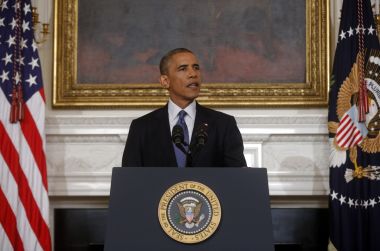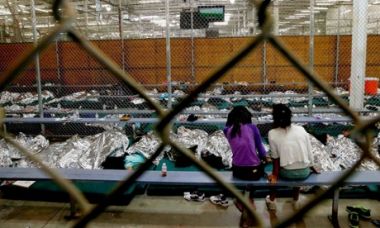Evangelical opinion split on Obama's immigration reforms

Barack Obama's announcement of reforms to America's immigrant laws has exposed divisions in US evangelical attitudes.
All sides agree that change is needed to deal fairly with the illegal immigrants in the country and pressure on the legislature from groups like the Evangelical Immigration Table has been mounting. However, Obama's unilateral action, bypassing Congress, has drawn mixed reactions.
President Obama introduced his measures by saying "our immigration system is broken, and everybody knows it". He condemned Republicans for refusing to pass a bipartisan immigration bill.
The reforms will affect more than 4 million people, mainly of Latin American heritage. Under the new rules, undocumented parents of children who are US citizens or legal residents will be able to apply for work permits lasting three years. A programme that gives temporary legal status to people who arrived in the US as children will be extended, meaning that as many as 300,000 more people could benefit.
The porous Mexico-US border has meant that around 11 million illegal immigrants are living in the US, many of whom have settled and raised families but still face deportation at any time. Efforts to reach a political consensus had long been deadlocked and President Obama forced through reform measures by executive order.
The reforms pose a problem for Republicans, who are increasingly looking to socially conservative Latino Christians for support but are anxious to be tough on immigration, a key voting issue for that community.
They have been welcomed by many Church groups including the National Hispanic Christian Leadership Conference (NHCLC), which represents more than 40,000 Latino evangelical churches in the US and claims a total membership throughout the region of 100 million people.
Republican-leaning NHCLC president Dr Samuel Rodriguez is a long-time campaigner for immigration reform. He backed the president's move, saying: "The President's forthcoming executive action, although not the preferable delivery mechanism, initiates a reconciliatory prescription necessary in addressing a defacto humanitarian crisis within our borders: millions of God's children created in his image living in the shadows.

"This merciful action takes place because for years our government, under the leadership of both parties, failed miserably as it pertains to immigration. For years, our elected officials sacrificed lives on the altar of political expediency. For years, rhetorical articulation fell short of redemptive action. For years, we as a nation stood by while families experienced separation, children suffered and national unity lay shattered."
He continued: "As an organisation committed to both Christian compassion and the rule of law, we call upon Congress and President Obama to immediately work together in passing legislation that will permanently secure our borders, protect our values and facilitate a platform upon which once again we can shine as a 'city upon a hill'."
Sojourners president Jim Wallis said that "faith leaders and all those who have spent years trying to fix our broken immigration system should feel gratitude toward President Obama" for his actions. However, he criticised Republican politicians, saying: "Their anger and antipathy toward the White House are blinding them to the positive effects these measures will have for our society. Even after decades living and working in our nation's capital, I'm still amazed at the many ways political ideology can prevent us from having 'eyes that see' and 'ears that hear'. I lament that our political discourse has come to this."
However, others criticised the timing and the propriety of the president's action. Institute on Religion and Democracy President Mark Tooley warned against "political brinkmanship" and said that church voices should be arguing for "some level of sustainable national consensus". Leading conservative commentator Russell Moore, president of the Ethics and Religious Liberty Commission of the Southern Baptist Convention, wrote in a column for Time magazine that he was in favour of immigration reform but disagreed with the timing of Obama's action, arguing that he should have given Congress more time to agree a deal.
Moore wrote that he had asked Obama "not to act unilaterally, but to work for consensus through the legislative process. To his credit, he did just that for a long while, and the Republican Congress took no action. He also told me, and others, that his patience was not endless on this.
"Now the President says that he is out of patience and that he will use executive authority to achieve some of the goals of immigration reform. We can debate whether the President has the authority to undertake these actions unilaterally, but, regardless, this is an unwise and counterproductive move."
Florida megachurch pastor Joel Hunter said he celebrates the "partial step" Obama is taking. "I welcome this incremental step," Hunter said. "I don't look upon it as amnesty. I look upon it as a partial solution to an ongoing problem and I do see the need in human terms, in terms of keeping families together and bringing people out of the shadows."
Obama was fiercely attacked by Republican politicians and commentators. House Speaker John Boehner said in a statement: "By ignoring the will of the American people, President Obama has cemented his legacy of lawlessness and squandered what little credibility he had left." Jay Sekulow, chief counsel of the American Center for Law and Justice, said: "The action is an unconstitutional power grab of historic proportions by a President whose tenure has centered on governing by overreach."











